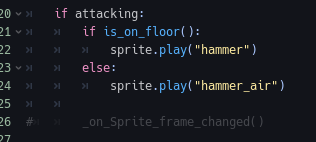You signed in with another tab or window. Reload to refresh your session.You signed out in another tab or window. Reload to refresh your session.You switched accounts on another tab or window. Reload to refresh your session.Dismiss alert
The question above is simple.
I'm asking this because there has been a bunch of occasion where I had to emit the function tied to the frame_changed signal manually after play(), because otherwise there's a animation delay for the code I expected to be updated on frame change, but doesn't actually happen because between the animation change, the frame index is the same.
Example:
Notice the signal isn't emitted on frame 0, the first frame of the new animation:
I looked at the code, and it would seem like the reason for it, again, is because, between animation switches, frame 0 and frame 0 is the same, and the code is optimised to not emit the signal in that case.
reacted with thumbs up emoji reacted with thumbs down emoji reacted with laugh emoji reacted with hooray emoji reacted with confused emoji reacted with heart emoji reacted with rocket emoji reacted with eyes emoji
Uh oh!
There was an error while loading. Please reload this page.
Uh oh!
There was an error while loading. Please reload this page.
-
The question above is simple.
I'm asking this because there has been a bunch of occasion where I had to emit the function tied to the
frame_changedsignal manually afterplay(), because otherwise there's a animation delay for the code I expected to be updated on frame change, but doesn't actually happen because between the animation change, the frame index is the same.Example:

Notice the signal isn't emitted on frame 0, the first frame of the new animation:

I looked at the code, and it would seem like the reason for it, again, is because, between animation switches, frame 0 and frame 0 is the same, and the code is optimised to not emit the signal in that case.
Beta Was this translation helpful? Give feedback.
All reactions